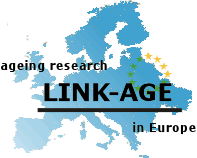Contact
|
Coordinator
Olivier Toussaint, PhD
Contact and information
Béatrice Rayet, PhD
LINK-AGE deputy coordinator
The University of Namur
URBC - 61, rue de Bruxelles
B-5000 Namur - Belgium
Tel: * 32 (0) 81 72 41 07
Fax: * 32 (0) 81 72 41 35
beatrice.rayet@fundp.ac.be
|
|
LINK-AGE
: coordination and consolidation of European biogerontology: en
route towards formation of a European college of biogerontology
|
Rational |
|  Europe and ageing
Europe and ageing
Europe
faces the immense challenge of unprecedented increase in
life expectancy. Although this state of affairs is the essentially
positive outcome from multiple improvements in health care
and socioeconomic circumstances, it nevertheless presents
great strains for all member and associated states of the
European Union in terms of increasing importance of age-related
health conditions and financial implications for the health
care and the social security system. There is urgent need
for more basic research on the underpinning science of biological
ageing, in order that it shall be possible to minimise dependency
and improve quality of life for the rapidly growing numbers
of older people.
|
|  Europe and ageing research
Europe and ageing research
Despite
its high quality, European research capacity in biogerontology
is still fragmented which results in scientific progress
limitation. A major cause is probably that the biology of
ageing is itself inherently complex with research targets
at many levels from molecules, cells, and tissues to entire
organisms, and in many different biomedical contexts (e.g.
dementia, diabetes, osteoporosis, cardiovascular diseases,
visual impairment, skin frailty, declining immune function,
etc.). The presently running European Integrated Projects
on biological ageing include Geha (genetics of healthy ageing),
Mimage (mitochondria in ageing) and Proteomage (conserved
mechanisms of ageing at the protein level). LINK-AGE will
be developed in close relation with these promising Integrated
Projects representing more than fifty European laboratories
and SME’s by bringing increased possibilities for
further short exchanges of personnel, participation in workshops,
and dissemination of knowledge.
The diversity of European research traditions is potentially
a rich resource for a topic as multi-faceted as biogerontology,
but only if these diverse elements communicate with each
other and develop ways of working together. So the scientific
impact of LINK-AGE will come from integrating this currently
fragmented research activity within Europe. Because it is
likely that some of the same fundamental mechanisms are
shared, Biogerontology intrinsically requires integration
of research across different biological levels, species,
and biomedical contexts.
Coordination
and Consolidation of European Biogerontology will represent
a step forward en route towards the formation of a European
College of Biogerontology.
|
|  Ethical aspects
Ethical aspects
LINK-AGE
will engage with broader ethical questions about research
on the ageing process and its potential impact on human
societies. The field receives considerable media attention,
resulting from the deep fascination of human societies with
recurring myths of eternal youth. Based on previous experience*,
LINK-AGE will encourage debate on these issues when there
are points of substance to resolve.
*: Matthews, et al. Informed consent of very old
patients and modern genomics. Biogerontology, 6, 81-4, 2005
SME
participation
At
present, there are few SME’s operating in the area
of biogerontology within Europe and this is a situation
that LINK-AGE will try to change. Scientists within industry
will be able to join LINK-AGE on an equal basis to other
non-industrial researchers (except possibly registration
fees). It is anticipated that the coordination activities
will spark new opportunities to form SME’s and/or
establish contact with and between existing SME’s.
|
|
| |
|



